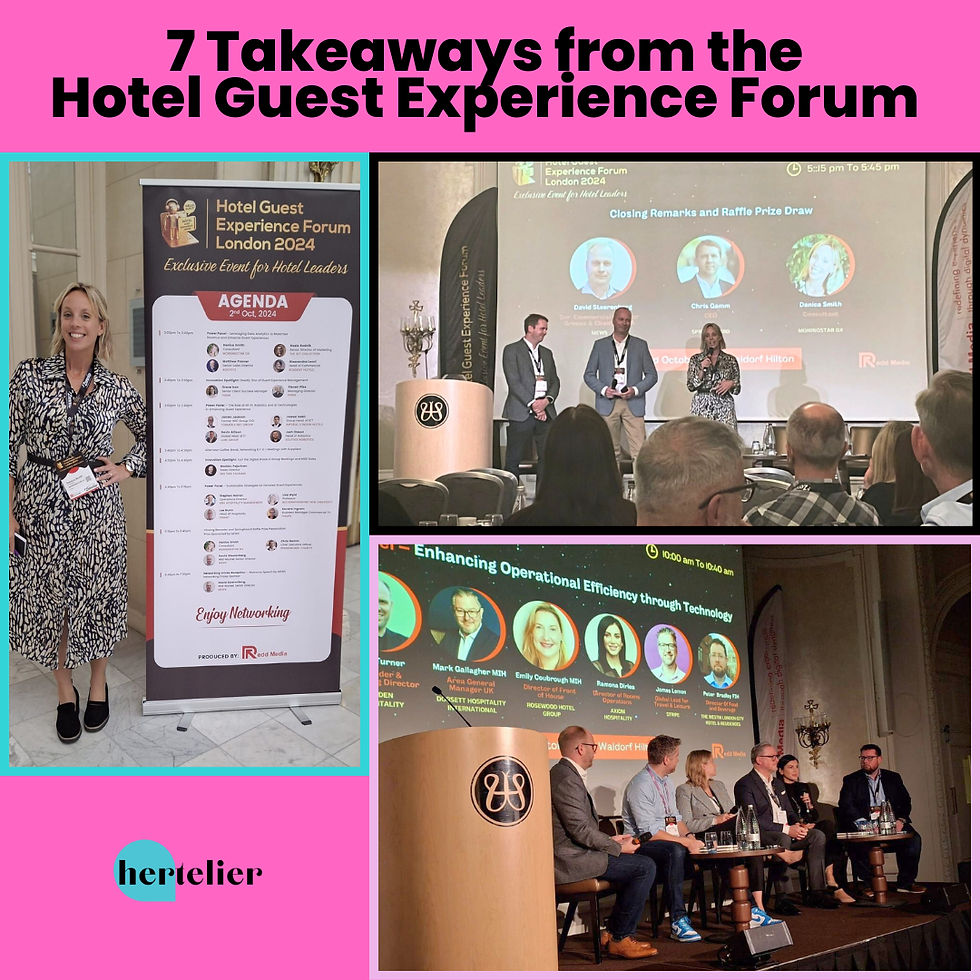7 Takeaways from the 2024 Hotel Guest Experience Forum
- Danica Smith
- Oct 29, 2024
- 3 min read
The first-ever Hotel Guest Experience Forum held earlier this month in London brought together hoteliers, tech innovators, and industry thought leaders to explore the future of guest experiences. Hertelier correspondent Danica Smith, CEO & Founder of MorningStar GX, attended the event, which featured insightful discussions and presentations highlighting the trends shaping hospitality.

Here are seven major takeaways that will drive the next wave of guest experience:
1. 📲 Digital Guest Journeys: 90% Automation, Zero Staff
Eva Klausner, Director of Guest Experience at Numa, discussed how the brand—launched during COVID—has embraced automation to operate 90% of its guest journey without staff engagement. This model has allowed Numa to streamline operations while reducing costs, though Eva emphasized that “a hybrid approach that includes a personal touch is key for certain guest segments.”
2. 💸 Payment Disruption: Installments Boost Conversions
James Lemon, Global Lead for Travel & Leisure at Stripe, shared data on the impact of payment flexibility. He noted that offering installment payment options can increase basket conversions by 40% and boost average order sizes by 60%. “This shift isn't just about convenience; it gives guests more reasons to opt for premium experiences,” James explained during the "Power Panel – Enhancing Operational Efficiency through Technology."
3. 🍱 F&B Influence: 65% of Booking Decisions
Peter Bradley, Director of Food and Beverage at The Westin London City Hotel & Residences, highlighted the growing importance of food and beverage in the booking process. During the panel discussion it was quoted that 65% of booking decisions are now influenced by a property’s dining options. “A unique culinary experience can be the difference between a guest choosing your property or another,” Peter said, underscoring the need for hotels to invest in their F&B offerings.
4. 🪪 Data Security: A Growing Priority
Kevin Hollinrake, MP, emphasized there was a 17% uptake of productivity for businesses who adopt technology during his welcome address. Throughout the day, it was evident the critical importance of data security. Booking.com´s recent research highlighted a staggering 1000% increase in phishing attempts since the launch of ChatGPT, underscoring the need for robust protection measures in the hospitality sector. “With more data comes a greater responsibility to protect it,” Hollinrake reminded attendees, stressing the importance of maintaining guest trust.
5. 🔍 New Search Trends: ChatGPT's Role in Travel Planning
The “Power Panel – Leveraging Data Analytics to Maximise Revenue and Enhance Guest Experiences” revealed a notable shift in how younger travelers plan their trips. According to the discussion, 1 in 3 Gen Z travelers now use ChatGPT for travel inspiration, a trend that challenges hotels to rethink their digital engagement strategies. By adapting content and marketing approaches, hotels can better connect with this AI-savvy audience.
6. 🌎 Sustainability Focus: Addressing Carbon Footprints
Stephen Harron, Operations Director at RBH Hotels, discussed the importance of integrating sustainability into business practices during a case study presentation. He highlighted that Investors are choosing sustainable hotels - the ability to measure this is key. 69% of a hotel chain’s carbon footprint stems from purchased goods and services, emphasizing that “tangible actions toward sustainability are key to attracting eco-conscious travelers and meeting investor expectations.”
7. 🤖 Robots in Operations: Enhancing Efficiency
Josh Olsson, Head of Robotics at Solstice Robotics, introduced the KettyBot Pro during his session, showcasing how robots can enhance hotel operations. During the panel discussion a use case was shared of a Melbourne property achieved a 35% check-in rate through robot assistance, while Hong Kong’s robot concierge, Denise, even gained a presence on Tripadvisor. “Robots aren’t here to replace staff but to support them, allowing them to focus on guest interactions,” the panel discussion highlighted how automation can ease operational burdens.
"Automated Anxiety" was coined, however, hotels like Rosewood said that through automation tools they have seen an increase in staff engagement – it elevated staffs time from the administrative tasks so they can focus on the guest and guest experience and do what they love to do. - Smoother operations to allow staff to build relationships.
Final Thoughts: Personalization, Data, and Digital Journeys Lead the Way
Throughout the conference, three core themes consistently emerged: customer-centric personalization, data-driven decision-making, and digitally-led guest journeys which was summarized perfectly by Jonathan Liu, Chief Commercial Officers at Verdi Hotels as he shared his experience of providing customer curated experiences across the new. As Emily Coubrough, Director of Front of House Rosewood Hotel Group, noted, “Automation can handle the routine, but it’s the human touch that makes a stay memorable.” This blend of advanced technology with personalized service offers a path forward for hotels aiming to meet the diverse needs of today’s travelers.
Danica Smith is the founder and CEO of Morningstar GX, a consultancy transforming guest experiences through data-driven insights and strategies.
.png)


